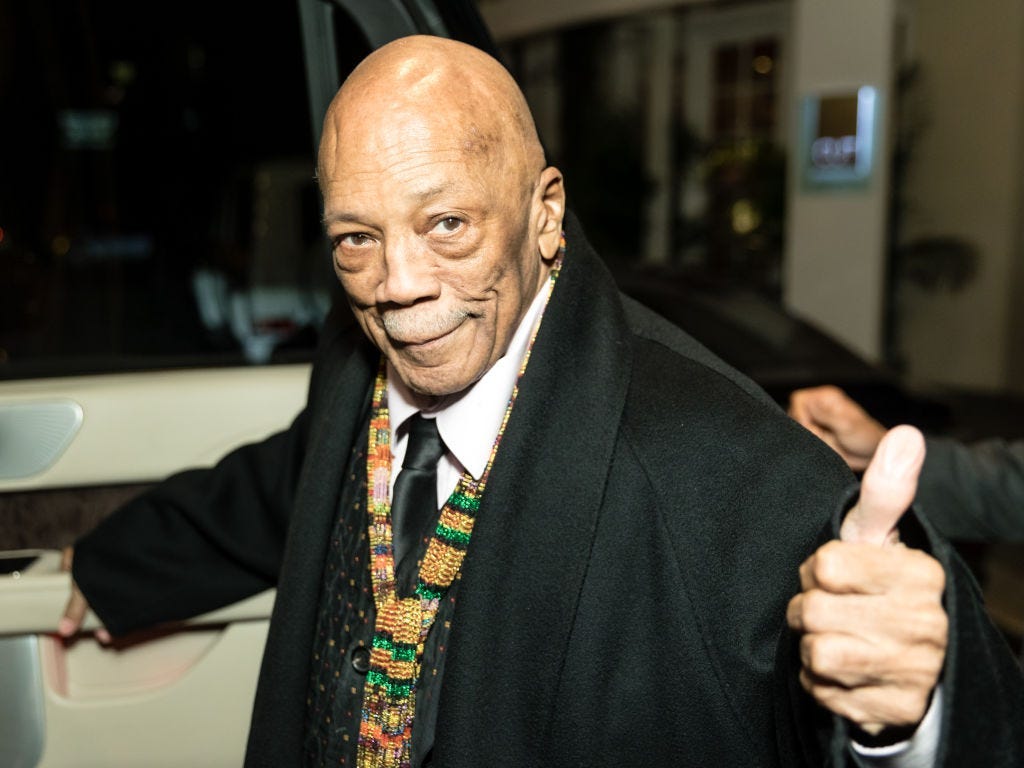Quincy Jones, the legendary music producer, composer, and cultural icon, passed away at the age of 91 in his Bel Air home on a Sunday night, surrounded by family. His publicist, Arnold Robinson, announced the news, affirming that Jones was best known for his ground-breaking work with Michael Jackson, particularly on the historic album “Thriller,” which has become one of the best-selling albums of all time. With an astonishing 28 Grammy Awards to his name, Jones was a towering figure in the music industry whose career spanned over seven decades. Although the cause of death remains unconfirmed, his family expressed their profound loss, highlighting his incredible life and the joy he brought to the world through his music. They requested privacy during this difficult time and suggested that donations be made to The Jazz Foundation of America in lieu of flowers.
Jones’s early journey in music began when his family moved to Bremerton, Washington, when he was just ten years old. He quickly took to the trumpet, performing alongside the then-unknown Ray Charles in Seattle’s vibrant jazz scene. At 18, Jones briefly attended Seattle University and Berklee College of Music before leaving to join jazz pianist Lionel Hampton on tour. His 1950s albums, including “Walking in Space” and “Gula Matari,” helped establish him as a prominent artist. However, it was his role as an arranger and producer that solidified his legacy, as he collaborated with musical giants such as Frank Sinatra, Aretha Franklin, Ella Fitzgerald, and many others. His work produced numerous hits, including Lesley Gore’s classic “It’s My Party” and the iconic charity single “We Are the World,” showcasing his talent for crafting timeless music.
One of Jones’s most significant achievements was his pioneering role as the first Black executive at a major American record label, which he accomplished while working with Mercury Records. His ascent through the ranks culminated in his promotion to vice president by 1964. In 1975, he founded Qwest Productions, where he created music for various artists, and later established Qwest Records. It was during this time that he began collaborating with Jackson, creating a revolutionary musical partnership that resulted in the albums “Off the Wall,” “Thriller,” and “Bad.” These records sold over 54 million copies in the U.S., propelling Jackson into superstardom and writing an important chapter in pop music history.
In addition to his musical success, Jones made significant contributions to film and television. He started with film scores, debuting in 1964 with “The Pawnbroker,” and transitioned to producing, including the critically acclaimed “The Color Purple,” which earned 11 Oscar nominations. His production companies, Quincy Jones Entertainment and Quincy Jones/David Salzman Entertainment, were responsible for influential television programs such as “The Fresh Prince of Bel-Air,” which served as a launching pad for actors like Will Smith. Jones’s ability to navigate and succeed in multiple domains of entertainment showcased his versatility and vision, helping to pioneer the role of music producers in film and television.
Throughout his remarkable life, Jones married three times: first to Jeri Caldwell from 1957 to 1966, then to Swedish model Ulla Andersson from 1967 to 1974, and finally to actress Peggy Lipton from 1974 until their divorce in 1990. He had a total of seven children, including notable actress Rashida Jones, who has continued to build upon her father’s legacy in the arts. Jones’s familial relationships were essential to him, and in a poignant statement about his passing, his family acknowledged the deep sadness of his loss while simultaneously celebrating what he contributed to the world through his talent and heart.
As we reflect upon Quincy Jones’s extraordinary life and career, it is clear that his impact on music, film, and popular culture has been monumental. He was a trailblazer who broke down barriers for Black artists and executives in the entertainment industry, paving the way for future generations. His collaborations with icons, ability to foster talent, and commitment to artistic excellence have left an indelible mark on the world. While the music industry mourns his passing, it is evident that Jones’s spirit will live on through the countless artists he inspired and the love and joy encapsulated within his expansive body of work. His contributions have ensured that he will always be remembered as one of the greatest figures in the history of music.

